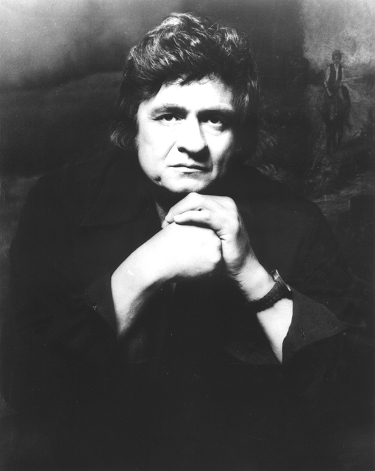Johnny Cash*
Class of 1977
- Entertainer

Share what you love with others.
Born in a three-room railroad house in Kingsland, Arkansas, in 1932, Johnny Cash was the fourth of seven children. The life of an Arkansas sharecropper was difficult during the Great Depression, but family hymn-singing around the piano made life tolerable for young Cash. In fact, music was a passion for him. He especially enjoyed listening to country singers on the radio. When his father told him that he could no longer play the radio because they could not afford a new battery, 12-year-old Cash cried, "But I can't live without music."
Cash's father, a cotton farmer, acquired a 20-acre plot of land from a federal land grant program. Young Cash helped out by picking 350 pounds of cotton a day and hunting rabbits to put food on the table.
After joining the U.S. Air Force, Cash taught himself to play the guitar. Upon his release from the service, he married and used the GI bill to study and become a radio announcer. When his wife became pregnant, however, he quit school and sold appliances door to door.
A friendship with two mechanics who were part-time musicians, Luther Perkins and Marshall Grant, launched Cash's career. The three formed a combo, Johnny Cash and the Tennessee Two. They auditioned with Sun Records, and "Hey, Porter", a song Cash wrote in Germany, was accepted for recording if Cash could write another good song for the flip side.
Thus, he wrote "Cry, Cry, Cry." The record was released in 1955 and sold nearly 100,000 copies, reaching the bestseller charts within six weeks. For the remainder of the decade, Cash had each of his releases reach the Top 10 charts in the country-and-western music categories. He sold six million records and starred on The Grand Ole Opry radio show.
Appearances in films and as a star of his own weekly ABC-TV program, The Johnny Cash Show, re-established Cash as a major star in the 1970s. In his autobiography, Man in Black, Cash said, "I only feel completely alive when I am performing and sharing with audiences the songs I love."
Cash's music has enriched the lives of millions. It has dealt with universal emotions such as pain, heartbreak, despair, disappointment, and loneliness. Dozens of his hit records have become American standards, including such all-time favorites such as "Cry, Cry, Cry"; "Folsom Prison Blues"; "There You Go"; "Big River"; "A Boy Named Sue"; and "I Walk the Line."
Cash maintained his integrity through every struggle in life. He set goals for himself and told young people, "Know your talents and potential. Never, never, never give up." Cash won the Guitar Player of the Year award in 1995 and was honored by the Kennedy Center that year for his life's work. He was also inducted into the Songwriters Hall of Fame, the Country Music Hall of Fame, and the Rock and Roll Hall of Fame.
Of his Horatio Alger Award, Cash once said, "It is an extremely prestigious award and I'm very proud of it. It makes me look again to my roots; to evaluate my opportunities against my efforts for success."
